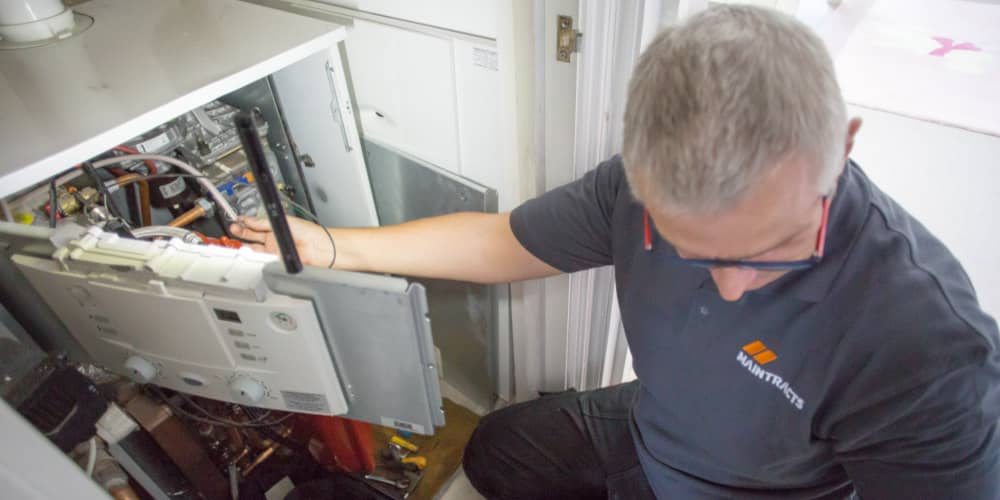Yes, absolutely. In our professional opinion, a leaking boiler is an emergency that would require attention from a Gas Safe registered engineer as soon as possible. Despite leaks being water, it is also important to know that a boiler can also leak gas.
If you smell gas or think there could be a gas leak from your boiler, you should call the National Gas Emergency Service immediately on 0800 111 999. The service is available 24/7. If you are a British Sign Language (BSL) user, you can use SignLive to contact the National Gas Emergency Service free of charge.
In this blog, we look at why a boiler leaking water is considered a plumbing emergency and what you can do to ensure you’re not without heating and water for longer than you need to be.
Why are boiler leaks so dangerous?
Boiler leaks can be extremely dangerous due to several reasons:
Risk of fire and explosion
If water leaks into the burner or electrical components of a boiler, it can short circuit the system, leading to a fire or explosion. Boilers operate at high temperatures and pressures, so any malfunction can have catastrophic consequences. Professional boiler servicing in Brixton is essential to identify such risks early and ensure safe operation.
Carbon monoxide poisoning
Boilers produce carbon monoxide (CO), a colourless, odourless gas that is highly toxic. If there's a leak, CO can escape into the surrounding air, posing a severe risk to occupants. Breathing in carbon monoxide can lead to symptoms such as dizziness, headaches, and even death.
Structural damage
Water leaks from boilers can cause structural damage to a building. Water can weaken walls, ceilings, and floors, leading to collapses or other significant structural failures. This is especially true in buildings with wooden structures, where water damage can cause rot and compromise the integrity of the entire building.
Mould and mildew growth
Persistent leaks can create a damp environment, which is conducive to the growth of mould and mildew. Mould spores can cause respiratory problems and allergies, especially in individuals who are sensitive to them.
Electrical hazards
Water and electricity don’t mix well. A boiler leak can create electrical hazards, especially if the water meets wiring or electrical components. This can lead to electrical shorts, shocks, and fires.
Damage to nearby equipment
Boiler leaks can damage other nearby equipment, electronics, or appliances. A Local Plumber to Fix Blocked Sink may also be able to assess water-related damage. Water can easily destroy computers, electrical panels, and other sensitive devices, leading to data loss or disruptions in operations.
Increased energy bills
Leaks can cause the boiler to work inefficiently, leading to increased energy consumption. This results in higher energy bills for the occupants.
Due to these risks, it's crucial to regularly maintain boilers, promptly repair any leaks, and ensure they are installed correctly by professionals. Additionally, installing carbon monoxide detectors in homes or buildings with boilers is highly recommended to alert occupants if there is a CO leak.
What should I do if my boiler is leaking water?
If you discover a boiler leak, it is best to:
- Switch off the water supply and central heating.
- When all electrical components are turned off, place buckets under the leaks and clean up any water spillage.
- Call a qualified Gas Safe registered professional (such as Maintracts Services) who should check the severity of the problem while on the phone to you and ensure you have followed the steps above (they should walk you through these steps if you haven’t completed them already). The priority is always to make you and your property as safe as possible until the engineer arrives.
- Wait for your engineer to arrive.
If you have discovered a leak and you have turned off your water supply and central heating, you will not be able to use your boiler until the engineer has arrived and solved the issue.
If it is a gas leak you suspect, turn off your gas supply; this is usually done at the isolation valve, a lever on your gas meter. If you can smell gas or think there could be a gas leak from your boiler, please always call the National Gas Emergency Service immediately on 0800 111 999 – no matter what time of day, this call will be answered.
How can I prevent future boiler leaks?
We always say that prevention is better (and normally cheaper!) than cure. The most successful way to prevent future leaks or other problems is to maintain your boiler. We recommend customers to get an annual boiler service. An annual service will mean that faults or potential problems can be spotted and dealt with before they turn in to bigger, costlier problems. Additionally, we also offer general electrical services in London, as well as emergency boiler repair services, to ensure your home is safe and well-maintained.
Powerflushing is another popular preventative service that is particularly effective if your heating system has been around a while! You wouldn’t need to powerflush your system every year, new boilers nowadays will last up to 10-15 years, so recommend flushing around the 10-year mark to prolong the life of your boiler as much as possible.

